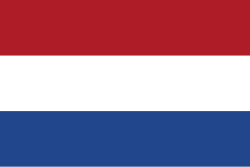Říšský komisariát Nizozemsko
| Říšský komisariát Nizozemsko německy Reichskommissariat Niederlande / nizozemsky Rijkscommissariaat Nederland
| |||||||
Geografie
| |||||||
| Obyvatelstvo | |||||||
8 834 000 (1940) | |||||||
| Státní útvar | |||||||
civilní správa | |||||||
Vznik | |||||||
Zánik | osvobození ostrova Schiermonnikoog 11. června 1945 | ||||||
| Státní útvary a území | |||||||
| |||||||
Říšský komisariát Nizozemsko (německy: Reichskommissariat Niederlande) byla civilní územně správní jednotka nacistického Německa během druhé světové války. Po německém obsazení Nizozemska dosadil Hitler do moci říšského komisaře bývalého rakouského kancléře Seyß-Inquarta. S okupačním režimem a komisariátem spolupracovala místní nacistická strana Nationaal-Socialistische Beweging v čele s Antonem Adriaanem Mussertem, který získal titul „vůdce nizozemského lidu“. Na konci války proběhla na tomto území operace Market Garden.
Externí odkazy
 Obrázky, zvuky či videa k tématu Říšský komisariát Nizozemsko na Wikimedia Commons
Obrázky, zvuky či videa k tématu Říšský komisariát Nizozemsko na Wikimedia Commons
Média použitá na této stránce
National flag and merchant ensign of Germany from 1933 to 1935.
National flag and merchant ensign of Germany from 1933 to 1935.
Autor: TRAJAN 117, Licence: CC BY-SA 3.0
Reichskommissariat Niederlande in 1942.
The Imperial Eagle or Emblem of the German Empire (German Reich, used 1935–1945), which features an eagle looking over its right shoulder, that is, looking to the left from the viewer's point of view. It is similar to the Parteiadler or Emblem of the Nationalsozialistische Deutsche Arbeiterpartei (NSDAP; known in English as the National Socialist German Workers' Party, or simply the Nazi Party), but the eagle of the latter is looking over its left shoulder, that is, looking to the right from the viewer's point of view.






